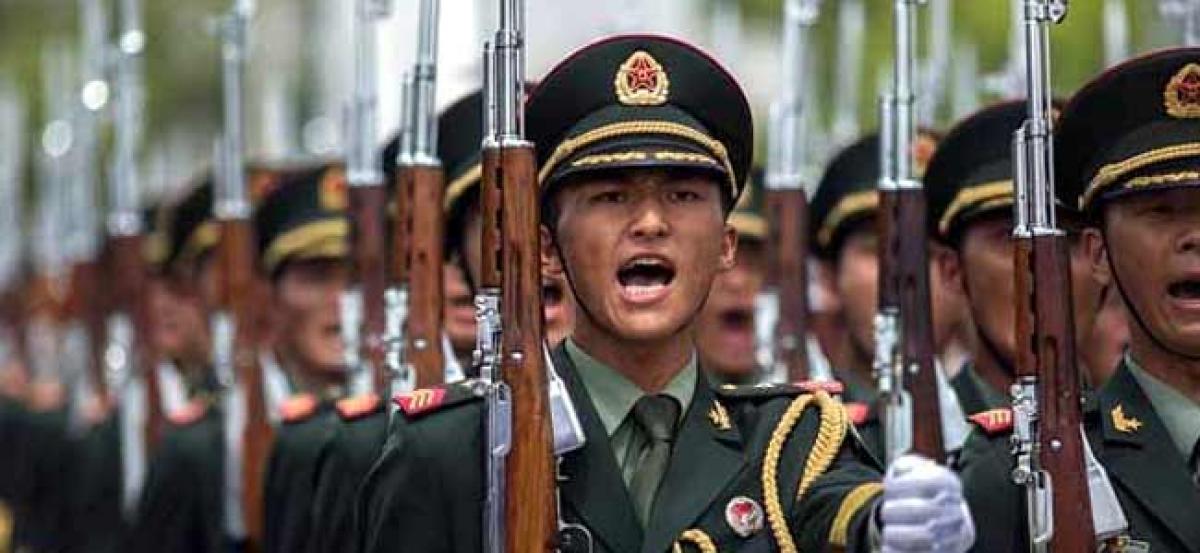Live
- Six Useful Strategies to Control Your Heart During the Pollution Season
- Phalodi Satta Bazar Predicts Close Race in Maharashtra Assembly Election 2024
- Federer Pays Heartfelt Tribute to Nadal Ahead of His Retirement: "An Epic Career"
- Odisha holds successful mega investors roadshow in Singapore
- PGTI Tour: Top stars to fight for honours in Servo Masters Golf
- SC upholds termination of LIC employee for absenting himself without intimation
- ‘Stone me or shoot me, won’t spare anyone,’ says Anil Deshmukh after discharge
- Siddaramaiah, Shivakumar turning Karnataka into Pakistan: K’taka BJP
- Zimbabwe records 70 suspected cholera cases, one death amid new outbreak
- Babri demolition day: No Assembly proceedings in Bengal on Dec 6
Just In

A former US army official has questioned what he calls the \"Chinese militarization of Pakistan\", citing an official CPEC announcement on September 17, 2017, whereby China would \"assist\" Pakistan in \"capacity building\" of its \"civil armed forces.\"
Washington D.C. : A former US army official has questioned what he calls the "Chinese militarization of Pakistan", citing an official CPEC announcement on September 17, 2017, whereby China would "assist" Pakistan in "capacity building" of its "civil armed forces."
In an op-ed titled 'Is Chinese Militarization of Pakistan Beginning?' published in the Washington, D.C.- based website The Daily Caller, Lawrence Sellin, a retired US Army Reserve Colonel, said the Chinese offer appears to be a predictable response to the proliferation of Islamic extremist groups and the festering independence insurgency, all in Pakistan's south western province of Balochistan.
"At face value, the Chinese offer appears to be a predictable response to the proliferation of Islamic extremist groups, the permanent Taliban support and recruiting network, and the festering independence insurgency, all in Pakistan's south western province of Balochistan, a region whose stability is critical to the success of CPEC, A USD 46 billion Chinese infrastructure investment in Pakistan," he wrote.
Sellin, who is a veteran of Afghanistan, northern Iraq and a humanitarian mission to West Africa, quoted a December 12, 2017, Urdu-language news site report as saying that China has offered to train Pakistani security forces to protect both the China-Pakistan Economic Corridor (CPEC) projects in Pakistan and the Chinese nationals working on them.
Pakistan has reportedly raised a Special Security Division (SSD) of Pakistan Army tasked with providing security to the under construction China Pakistan Economic Corridor (CPEC) and the workforce employed on the project.
The unit which will consist of 15,000 troops will have highly trained security personnel potent enough to counter any threat emerging to the mega project of CPEC.
Sellin said the total complement of Chinese needed to fulfill all the CPEC security requirements is expected to be sizable based on the size of the Special Security Division alone.
However, the number of Chinese military and security trainers to be stationed in Pakistan remains undisclosed.
Sellin in his write-up also mentions the announcement of a joint China-Pakistan space program by Air Chief Marshal Sohail Aman, Chief of the Air Staff of the Pakistan Air Force (PAF), that will begin by sending a satellite into orbit within the next two years.
He also referred to reports which have included rumors of Chinese purchases of large blocks of land in the Sonmiani region, Balochistan in this regard.
"China and Pakistan have found common ground in terms of maritime interest in the region. Gwadar port can be used for joint naval patrols in the Indian Ocean, further increasing the naval outreach of China and Pakistan in the region. Gwadar port will increase the countries' naval movements and further expand defense cooperation, especially in the naval field," Sellin said pointing to an agreement that was signed in April this year whereby a state-run Chinese company, the China Overseas Port Holding Company will handle the operations of Pakistan's strategic Gwadar port for a period of 40 years.
He added that the Chinese have been attracted to Gwadar primarily because of its proximity to the Straits of Hormuz, through which most of their energy flows and it provides a base from where they can exercise firm control over this energy flow, both in terms of monitoring and protection when the situation demands such effort.
Sellin has noted that naval operations based out of Gwadar will provide the Chinese with a near-continuous naval presence from the Makran coast [southern Pakistan on the Arabian Sea] to the Straits of Bab-el-Mandeb [entrance to the Red Sea and gateway to the Suez Canal]."
"The Chinese are also expanding the Gwadar International Airport to handle "heavies." That will provide an airlift capability linking Gwadar at the mouth of the Persian Gulf and the Chinese base in Djibouti at the entrance of the Red Sea and the Suez Canal," he wrote.
Referencing to Sri Lanka handing over authority over its southern port of Hambantota to the Chinese, for a 99-year lease, Sellin says that the Chinese presence in Hambantota outflanks both India and the U.S. naval base in Diego Garcia.
He further says that it would also provide an additional strategic choke point, a potential for regional hegemony and, in combination with the other developments, largely renders current U.S. policy in Afghanistan obsolete.

© 2024 Hyderabad Media House Limited/The Hans India. All rights reserved. Powered by hocalwire.com







